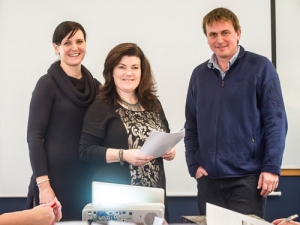Agri-Women's Development Trust creating future 'farm CFOs'
Graduates of a newly-updated Agri-Women’s Development Trust (AWDT) course are taking more value than ever from the programme, with some even walking away calling themselves the “farm CFO”.
 AWDT executive director Lindy Nelson (centre), Justine Kidd and Sam Orsborn facilitating part of AWDT’s Understanding Your Farming Business Programme.
AWDT executive director Lindy Nelson (centre), Justine Kidd and Sam Orsborn facilitating part of AWDT’s Understanding Your Farming Business Programme.
The success of a national programme to develop the business skills and confidence of women on sheep and beef farms has led to its extension in 2016.
The programme empowers women to view themselves and their farming roles differently, while building their technical and communication skills. The RMPP coordinates industry and Government efforts to increase profitability and productivity in the red meat sector.
The programme 'Understanding Your Farming Business', developed and delivered by the Agri-Women's Development Trust, will be back in 2016 to enable 220 women in 14 regions to participate, with each Red Meat Profit Partnership (RMPP) funded programme limited to 16 women.
Next year the programme will be extended from three to four months to include new material on leadership development and provide opportunities to involve farming partners. Other enhancements include involving more Māori farming women.
This year 157 women farming partners from 10 centres from Invercargill to Kerikeri completed the programme. They were now creating significant practice changes within their farming businesses using new business skills and confidence according to AWDT executive director Lindy Nelson.
"The result of these changes will be seen in the bottom line of farming businesses in years to come. All participants said the programme has increased their confidence and knowledge and helped them see themselves as critical farming partners. Previously, many had described themselves as 'just a mum or just an extra pair of hands'.
"During the programme the women developed a greater understanding of how their businesses worked and that their opinions and skills added value, both strategically and operationally. They became more actively involved in strategic decisions, business planning and overseeing business performance.
"Operationally, the women also became more active within the farm's advisory team of the banker, accountant and farm advisor, as well as helping run the business out on the farm and in the office."
Three-quarters of the participants previously had no formal farm business plan. After the programme 94% reported making changes to the way they plan. All had grown in confidence in comprehending the annual accounts and asking for clarification if needed.
Nelson says that before the programme 68% of participants had little or no involvement in budgeting. After the programme 83% wanted to do the budget with their farming partner, or lead the budgeting role. Two-thirds identified a lack of training as the main barrier to budgeting.
"52% had previously not used any business or farm key performance indicators. After the programme 70% had planned to introduce them. Almost all gained understanding of and/or confidence in their risk assessment factors and how they can influence them," she said.
"We're finding that men in the sector are valuing newly-confident business partners at both strategic and operational levels. This is critical to the success of any farming partnership. They are also less resistant to farming business practice changes introduced by their partner."
Initial comparisons of the programme had shown that it met some of the learning outcomes of the Diploma in AgriBusiness Management, potentially allowing participants to apply for recognition of this.
"Our goal is for at least 10% of New Zealand sheep and beef farming women to complete the programme by 2020."
Confirmed regions for 2016 are Blenheim, Cheviot, Wanaka, Gore, Wairarapa, Tararua, Hawkes Bay, Rotorua, National Park, Gisborne, Hunterville and Taranaki. Two more programmes will be delivered for Māori women.
To express interest in the programme and for more information email This email address is being protected from spambots. You need JavaScript enabled to view it.
At Pāmu’s Kepler Farm in Manapouri, mating has wrapped up at the across-breed Beef Progeny Test.
More than 150 people turned up at Parliament recently to celebrate the 20th anniversary of Horticulture New Zealand (HortNZ).
Biosecurity New Zealand says Kiwis should continue to keep an eye out for yellow-legged hornets (Vespa velutina) over the holiday season.
The Push-Up Challenge, an event which combines mental health and fitness, is set to launch in New Zealand in 2026.
Last month's Agritechnica event led to a wide group of manufacturers celebrating successes when the 2026 Tractor of the Year Competition winners, selected by a panel of European journalists, were announced in Hanover Germany.
According to the latest Federated Farmers banking survey, farmers are more satisfied with their bank and less under pressure, however, the sector is well short of confidence levels seen last decade.

OPINION: The release of the Natural Environment Bill and Planning Bill to replace the Resource Management Act is a red-letter day…
OPINION: Federated Farmers has launched a new campaign, swapping ‘The Twelve Days of Christmas’ for ‘The Twelve Pests of Christmas’ to…